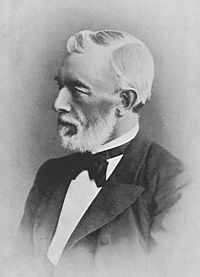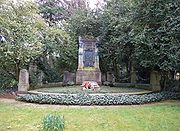
Johann von Miquel
Encyclopedia


Germany
Germany , officially the Federal Republic of Germany , is a federal parliamentary republic in Europe. The country consists of 16 states while the capital and largest city is Berlin. Germany covers an area of 357,021 km2 and has a largely temperate seasonal climate...
statesman.
Born at Neuenhaus
Neuenhaus
Neuenhaus is a town in the district of Grafschaft Bentheim in Lower Saxony, and is the seat of a like-named Joint Community . Neuenhaus lies on the river Vechte near the border with the Kingdom of the Netherlands and is roughly 10 km northwest of Nordhorn, and 30 km north of...
, Kingdom of Hanover
Kingdom of Hanover
The Kingdom of Hanover was established in October 1814 by the Congress of Vienna, with the restoration of George III to his Hanoverian territories after the Napoleonic era. It succeeded the former Electorate of Brunswick-Lüneburg , and joined with 38 other sovereign states in the German...
in 1829 as a descendant from a French
France
The French Republic , The French Republic , The French Republic , (commonly known as France , is a unitary semi-presidential republic in Western Europe with several overseas territories and islands located on other continents and in the Indian, Pacific, and Atlantic oceans. Metropolitan France...
family that had emigrated during the French Revolution
French Revolution
The French Revolution , sometimes distinguished as the 'Great French Revolution' , was a period of radical social and political upheaval in France and Europe. The absolute monarchy that had ruled France for centuries collapsed in three years...
, Miquel learnt law at the universities of Heidelberg and Göttingen. Studying the writings of Karl Marx
Karl Marx
Karl Heinrich Marx was a German philosopher, economist, sociologist, historian, journalist, and revolutionary socialist. His ideas played a significant role in the development of social science and the socialist political movement...
he became a convert to an extreme revolutionary, socialistic
Socialism
Socialism is an economic system characterized by social ownership of the means of production and cooperative management of the economy; or a political philosophy advocating such a system. "Social ownership" may refer to any one of, or a combination of, the following: cooperative enterprises,...
and atheistic creed; but though he entered into correspondence with Marx with the object of starting a revolutionary movement, he does not appear to have taken any overt part in the Revolutions of 1848–1849
Revolutions of 1848
The European Revolutions of 1848, known in some countries as the Spring of Nations, Springtime of the Peoples or the Year of Revolution, were a series of political upheavals throughout Europe in 1848. It was the first Europe-wide collapse of traditional authority, but within a year reactionary...
.
Further study of political economy soon enabled him to pass out of this phase, and in 1850 he settled down to practise as an advocate at Göttingen. He acquired a reputation as an able lawyer and rising politician, especially for his knowledge of financial questions. He was one of the founders of the German National Association
German National Association
The German National Association was a liberal political organisation, precursor of a party, in the German Confederation that existed from 1859 to 1867...
, and in 1864 he was elected a member of the Hanoverian parliament
Parliament
A parliament is a legislature, especially in those countries whose system of government is based on the Westminster system modeled after that of the United Kingdom. The name is derived from the French , the action of parler : a parlement is a discussion. The term came to mean a meeting at which...
as a Liberal
Liberalism
Liberalism is the belief in the importance of liberty and equal rights. Liberals espouse a wide array of views depending on their understanding of these principles, but generally, liberals support ideas such as constitutionalism, liberal democracy, free and fair elections, human rights,...
and an opponent of the government. He accepted the annexation of Hanover by Prussia
Prussia
Prussia was a German kingdom and historic state originating out of the Duchy of Prussia and the Margraviate of Brandenburg. For centuries, the House of Hohenzollern ruled Prussia, successfully expanding its size by way of an unusually well-organized and effective army. Prussia shaped the history...
without regret, and was one of the Hanoverians whose parliamentary abilities at once won a commanding position in the Prussian parliament, which he entered in 1867.
For some reason, perhaps because Bismarck
Otto von Bismarck
Otto Eduard Leopold, Prince of Bismarck, Duke of Lauenburg , simply known as Otto von Bismarck, was a Prussian-German statesman whose actions unified Germany, made it a major player in world affairs, and created a balance of power that kept Europe at peace after 1871.As Minister President of...
did not entirely trust him, he did not at this time attain quite so influential a position as might have been anticipated; nevertheless he was chairman of the parliamentary committee which in 1876 drafted the new rules of legal procedure, and he found scope for his great administrative abilities in the post of mayor of Osnabrück
Osnabrück
Osnabrück is a city in Lower Saxony, Germany, some 80 km NNE of Dortmund, 45 km NE of Münster, and some 100 km due west of Hanover. It lies in a valley penned between the Wiehen Hills and the northern tip of the Teutoburg Forest...
. He held this position from 1865 to 1870, and again from 1876 to 1879, being in the meantime (1870–1873) a director of the Discontogesellschaft.
In 1879, he was elected Lord Mayor of Frankfurt am Main, where he gained a great reputation for the energy with which he dealt with social questions, especially that of the housing of the poor. Probably owing to his early study of socialism, he was very ready to support the new social reforms of Bismarck. He was the chief agent in the reorganization of the National Liberal Party
National Liberal Party (Germany)
The National Liberal Party was a German political party which flourished between 1867 and 1918. It was formed by Prussian liberals who put aside their differences with Bismarck over domestic policy due to their support for his highly successful foreign policy, which resulted in the unification of...
in 1887, in which year he entered the imperial Reichstag
Reichstag (German Empire)
The Reichstag was the parliament of the North German Confederation , and of the German Reich ....
.
After Bismarck's fall in 1890, he was chosen Prussian minister of finance, and held this post for ten years. He distinguished himself by his reform of the Prussian system of taxation, the one really successful measure of the new reign in internal affairs. An attempt, however, to reform the system of imperial finance in 1893-1894 failed, and much injured his reputation. Miquel had entirely given up his Liberalism, and aimed at practical measures for improving the condition of the people irrespective of the party programmes; yet some of his measures, such as that for taxing Waarenhuser (stores), were of a very injudicious nature. He professed to aim at a union of parties on the basis of the satisfaction of material interests, a policy to which the name of Sammlung ("Collective") was given; but his enemies accused him of constantly intriguing against the three chancellor
Chancellor
Chancellor is the title of various official positions in the governments of many nations. The original chancellors were the Cancellarii of Roman courts of justice—ushers who sat at the cancelli or lattice work screens of a basilica or law court, which separated the judge and counsel from the...
s under whom he served, and of himself attempting to secure the first place in the state.
The sympathy that he expressed for the Agrarians
Agrarianism
Agrarianism has two common meanings. The first meaning refers to a social philosophy or political philosophy which values rural society as superior to urban society, the independent farmer as superior to the paid worker, and sees farming as a way of life that can shape the ideal social values...
increased his unpopularity among Liberals and industrials; but he pointed out that the state, which for half a century had done everything to help manufactures, might now attempt to support the failing industry of agriculture
Agriculture
Agriculture is the cultivation of animals, plants, fungi and other life forms for food, fiber, and other products used to sustain life. Agriculture was the key implement in the rise of sedentary human civilization, whereby farming of domesticated species created food surpluses that nurtured the...
. In June 1901, the rejection of the Canal Bill led to a crisis, and he was obliged to send in his resignation. His health was already failing, and he died on 8 September of the same year at his house in Frankfurt.

